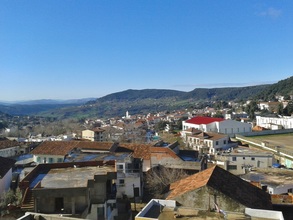
View from my balcony
Trundeling through the Tunisian countryside this time, I saw what would have made the Romans feel at home. Great, wide bowls of wheatfields, broken up with the occasional olive plantation, or with avenues of straight poplars leading to French built manors on top of cols. Here and there an ignored triumphal arch or toppled column marked their presence. Only a faint backdrop of twisted mountains suggested you weren’t on the northern side of the Mediterranean.
I’d been surprised at how verdant Egypt had been, but it at least had the decency to look tropical, all palm trees and sugar cane. Despite being on the same latitude as Gibraltar, northern Tunisia looked more like France or perhaps southern Tuscany. Things got even weirder when I reached my destination, the mountains overlooking Algeria around the village of ‘Ain Draham. Here the profusion of pine and heather lent an almost Scottish feel to the highlands, one helped by the extreme changeability of the weather. I could go for a walk in glorious sunshine, sit out a hailstorm in a café, then walk home through sleet and snow.
The village itself had a slight alpine feel, no doubt because the French had built it initially as a hill-station to escape the heat. There were lots of beautiful old buildings with red, sloping roofs and contrasting green highlights. Sadly, as it’s cheaper to build a new house than maintain an old one, Ave. Habib Bourguiba was lined with old wrecks, and Arab sprawl was starting to fill the valleys below. Still, it hadn’t quite reached tipping point, and the view from my balcony whilst the sun was shining was spectacular.
I’d been surprised at how verdant Egypt had been, but it at least had the decency to look tropical, all palm trees and sugar cane. Despite being on the same latitude as Gibraltar, northern Tunisia looked more like France or perhaps southern Tuscany. Things got even weirder when I reached my destination, the mountains overlooking Algeria around the village of ‘Ain Draham. Here the profusion of pine and heather lent an almost Scottish feel to the highlands, one helped by the extreme changeability of the weather. I could go for a walk in glorious sunshine, sit out a hailstorm in a café, then walk home through sleet and snow.
The village itself had a slight alpine feel, no doubt because the French had built it initially as a hill-station to escape the heat. There were lots of beautiful old buildings with red, sloping roofs and contrasting green highlights. Sadly, as it’s cheaper to build a new house than maintain an old one, Ave. Habib Bourguiba was lined with old wrecks, and Arab sprawl was starting to fill the valleys below. Still, it hadn’t quite reached tipping point, and the view from my balcony whilst the sun was shining was spectacular.
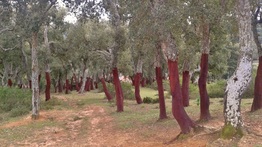
Cork Oaks post-harvest
My hotel, overall, was very good. The shower had power and was hot. I had a heater in my room. Yet at night, when the wind tore over the ridge, it moaned its way through the cracks and slammed doors already loose in their holdings like a pubescent teenager in ill-fitting clothes. If I went down to the lobby to use the wifi, I had to layer up and wrap myself in my scarf, as I could often see my breath. Every hotel I’ve stayed in has had wifi, yet its effective range is often less than five metres. If you get a room directly above the reception desk then you’re in luck, as you might be able to access it from your bed. Maybe.
It was beautiful roaming in the forests on the hills. A lot of them were filled with cork oaks. Their bark has been harvested since time immemorial for bottle stoppers, and rather than doing the tree any harm it actually causes it to take in three to five times as much CO2 as normal whilst it grows back. It also provides a great habitat for birds and animals, and provides a steady income for the locals that encourages them to treasure their woodlands. Every time you have a screwcap bottle of wine I hope you consider how you are basically destroying the Earth with your callow heartlessness. So. Evil.
It was beautiful roaming in the forests on the hills. A lot of them were filled with cork oaks. Their bark has been harvested since time immemorial for bottle stoppers, and rather than doing the tree any harm it actually causes it to take in three to five times as much CO2 as normal whilst it grows back. It also provides a great habitat for birds and animals, and provides a steady income for the locals that encourages them to treasure their woodlands. Every time you have a screwcap bottle of wine I hope you consider how you are basically destroying the Earth with your callow heartlessness. So. Evil.
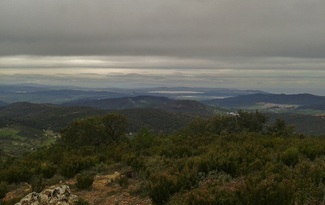
What we all thought Algeria looked like
The best thing from a traveller’s point of view is that there are paths everywhere, as people need access to trees to harvest them. That meant I could wander as I was wont, sheltered from the wind, and gaze out across Algeria. Certainly the view wasn’t quite as I anticipated it. The country people were very friendly, albeit a little surprised to see a foreigner so stupid to visit in the middle of winter.
I had a very interesting chat with a middle aged guy I forgot to catch the name of. He was sunning himself on a plastic lawn chair outside what I presume was his shop, on a road in the middle of nowhere. He had an easy smile, but one that showed that his front teeth had all been knocked out. Apparently he had been an air force officer, when Ben Ali had heard a rumour about a coup being plotted and sent them all to prison. He didn’t dwell on what he had experienced during his three years inside, but I would surmise it wasn’t a walk in the park. What really infuriated him though was what had happened when he got out. Every day he had to walk four miles to the nearest post office to register. That had been going on for 15 years when the revolution broke out and put a stop to it.
Apparently things like this were very common under Ben Ali. People were made to register sometimes up to three times a day at different locations. It made living a normal life, and holding down a job, very difficult, especially as they could be made to wait for a long time when they finally got there. I find it interesting, though, that this wasn’t a law, or an official policy. It was just generally agreed that something like it was a good idea, and it was up to individual officers’ initiative to work out what punishment was imposed. At the risk of Godwinning myself, I find it interesting that a similar thing went on under the Nazis. Hitler, apparently, had no real policies himself. It was up to his ministers and bureaucrats to come up with policies they thought would please the great leader, with each upping the ante in terms of extremism in an effort to get noticed.
I wonder if this vacuum at the heart of politics is something distinctive of a certain type of totalitarianism. It certainly brings home to me the smallness of most dictators. I think I had a default unthought that dictators were probably to some degree ubermensch – evil sure, but to some degree they must be great thinkers or powerful personalities. I guess the whole cult of personality builds towards that. For me, one of the most obscene revelations of the Syrian revolution is that Assad loves I’m Sexy and I Know It. The idea of such a half-man listening to this song whilst unwinding from a hard day ordering massacres makes me so angry. It also makes me realise that most dictators are probably just the front guys for a whole raft of interests, and those interests remain when the dictator is disposed. The worry is that when the dictator goes, those really in power remain, and after a period of destabilising democracy, they start to reassert themselves. Certainly that doesn’t seem a thousand miles from what we’ve seen from the Arab Spring thus far.
I asked my Air Force friend what he thought of the revolution. His face lit up. “How long have you been in this country?” I told him two weeks. “During this time, has anyone asked for your papers? Has anyone told you where you can or cannot go? For this, the revolution was wonderful. Everything else will come.”
I had a very interesting chat with a middle aged guy I forgot to catch the name of. He was sunning himself on a plastic lawn chair outside what I presume was his shop, on a road in the middle of nowhere. He had an easy smile, but one that showed that his front teeth had all been knocked out. Apparently he had been an air force officer, when Ben Ali had heard a rumour about a coup being plotted and sent them all to prison. He didn’t dwell on what he had experienced during his three years inside, but I would surmise it wasn’t a walk in the park. What really infuriated him though was what had happened when he got out. Every day he had to walk four miles to the nearest post office to register. That had been going on for 15 years when the revolution broke out and put a stop to it.
Apparently things like this were very common under Ben Ali. People were made to register sometimes up to three times a day at different locations. It made living a normal life, and holding down a job, very difficult, especially as they could be made to wait for a long time when they finally got there. I find it interesting, though, that this wasn’t a law, or an official policy. It was just generally agreed that something like it was a good idea, and it was up to individual officers’ initiative to work out what punishment was imposed. At the risk of Godwinning myself, I find it interesting that a similar thing went on under the Nazis. Hitler, apparently, had no real policies himself. It was up to his ministers and bureaucrats to come up with policies they thought would please the great leader, with each upping the ante in terms of extremism in an effort to get noticed.
I wonder if this vacuum at the heart of politics is something distinctive of a certain type of totalitarianism. It certainly brings home to me the smallness of most dictators. I think I had a default unthought that dictators were probably to some degree ubermensch – evil sure, but to some degree they must be great thinkers or powerful personalities. I guess the whole cult of personality builds towards that. For me, one of the most obscene revelations of the Syrian revolution is that Assad loves I’m Sexy and I Know It. The idea of such a half-man listening to this song whilst unwinding from a hard day ordering massacres makes me so angry. It also makes me realise that most dictators are probably just the front guys for a whole raft of interests, and those interests remain when the dictator is disposed. The worry is that when the dictator goes, those really in power remain, and after a period of destabilising democracy, they start to reassert themselves. Certainly that doesn’t seem a thousand miles from what we’ve seen from the Arab Spring thus far.
I asked my Air Force friend what he thought of the revolution. His face lit up. “How long have you been in this country?” I told him two weeks. “During this time, has anyone asked for your papers? Has anyone told you where you can or cannot go? For this, the revolution was wonderful. Everything else will come.”
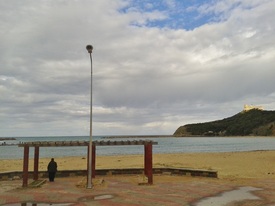
On a particularly sunny day I caught the bus down the mountain to visit Tabarka. It’s a seaside resort with the best diving in Tunisia. Unfortunately, the dive shops were taking the opportunity to do some renovations whilst it was quiet, but that gave me the chance to wander round this tranquil town. It was resolutely modern, with an almost flash marina, but aside from the clear corners cut and work unfinished, a herd of goats was roaming around and having to be chased from the cafés and posh restaurants.
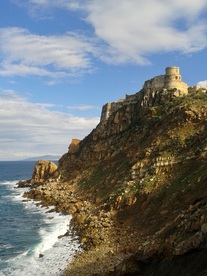
There was a Genoese fort on an old island now connected by a causeway. It sat dramatically above some wave teased cliffs, and looked gorgeous when the sun chased the clouds away and shone forth beneficently upon it. It was also officially the property of the army, which still seems to be the majority landowner in Tunisia, and you weren’t allowed in. Weirdly, all army property has this bizarre symbol on it that looks like it was crayoned by a child, but as it’s often next to a stern no photo sign I haven’t got a picture of it for you. The fort really wasn’t doing anything for the African flavour of the place, but then much of Tunisia’s coastline was under European control for much of its history.
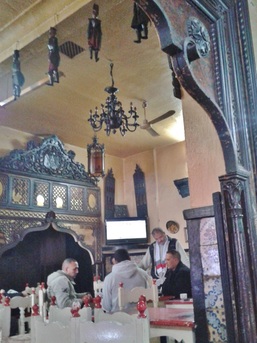
The other highlight of Tabarka (that fort was one, keep up!) was an old Ottoman café. It didn’t look much from outside, with its large plastic awning, but the doors and the woodwork inside were beautifully carved and painted, and the tiles were covered in the tobacco of ages. There were lots of giant Ottoman soldier puppets hanging from the ceiling, each chandelier was unique, and there was a raised dais where musicians play during the summer festival. Yet what I liked most about it was that it was just another café to the locals. A TV was playing the football in a corner, most guys were mucking around with cards, and tea was just 15 pence for a glass with a chunk of orange in it.
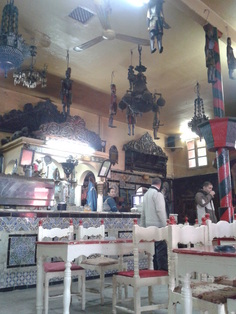
I like the idea that it can survive as a proper café, without needing to go down the tourist route of preserving it in aspic and charging ridiculous prices. Some people would probably complain about the television and the strip fluorescent lighting, but I loved the fact that it was a slice of real life. I remember wandering in the georgian valleys of Turkey with a photographer, and he was complaining how all the satellite dishes on the wooden peasant shacks were ruining his photos. Yet I think it’s almost better when you see that tradition continues in a modern context: it implies that these traditions will carry on, that they have been adapted and are still alive, rather than remaining frozen as a museum piece. If the café was reliant on tourists then a downturn like the one Tunisia is currently experiencing could wipe it out, but the fact it’s doing well as a local café means it will probably have legs.
Market day in ‘Ain Draham was interesting, as the folks from surrounding villages came in and the cafés filled up. The number of headscarves went up, and some old women had the Berber tattoos on their cheeks and chin, but everyone was still very friendly and chatty. One woman stopped me to ask about the snow in England and how bad it was. To be fair, as Premiership football was being broadcast everywhere it probably wasn’t that surprising.
Tunisia is completely sport mad, with gaps in football being devoted to handball. Apparently Ben Ali tried to promote sport to distract people from politics. Certainly there are an inordinate amount of large sporting academies everywhere you look, and Tunisia punches above its weight internationally. Sometimes I wish I cared even a tiny bit about football, as it would give me an in with about a third of the planet.
However, the cold was starting to get to me. The cold weather at home had translated itself into rain and sleet by the time it made its way down here, and going walking was becoming less pleasant. I resolved to head south and start getting warm.

 RSS Feed
RSS Feed
